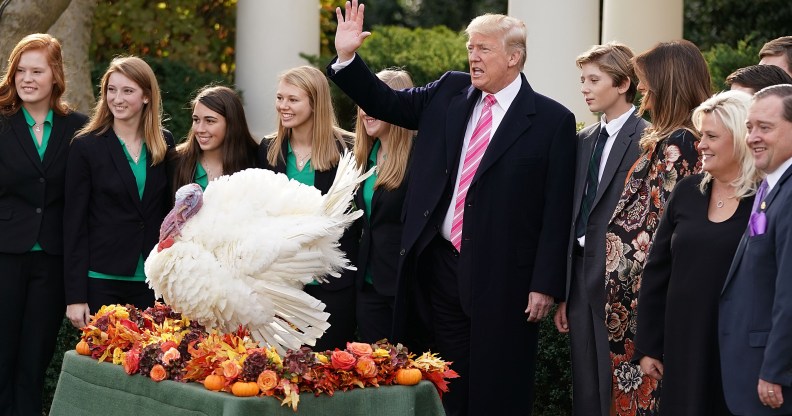Trump administration demanded 4-H youth group ‘drop LGBT policy’

President Donald Trump (C), first lady Melania Trump, their son Barron, National Turkey Federation Chairman Carl Wittenburg and his family and members of the Draper County, Minnesota, 4-H chapter pose for photographs in the Rose Garden at the White House November 21, 2017 in Washington, DC. (Chip Somodevilla/Getty Images)
The administration of President Donald Trump reportedly pressured international youth organisation 4-H to drop its LGBT+ policy, reports the Des Moines Register.
The international organisation, which aims to “engaging youth to reach their fullest potential while advancing the field of youth development,” is administered in the US by the National Institute of Food and Agriculture (NIFA) of the United States Department of Agriculture (USDA).
NIFA’s former director Sonny Ramaswamy, who left the agency in early May, told the Des Moines Register that the request to end the policy of explicitly welcoming LGBT+ members into the organisation came from Heidi Green, then-chief of staff for US Secretary of Agriculture Sonny Perdue, “within days of the LGBT guidance’s publication.”
The guidelines became the target of religious and conservative groups, who lobbied for their removal in the latest attack on LGBT+ protections from the Trump administration, who sought to impose a ban on transgender members serving in the military and is reportedly planning a change in the definition of “sex” that would effectively deny the existence of transgender people.
Controversy over 4-H’s LGBT+ policy of inclusion spread nationwide
4-H, which has six million members, introduced a new guidance to ensure protections for its LGBT+ members as part of a wider push to modernise the organisation.
The document defined terms such as “sexual orientation, gender expression, sex, gender identity” and set out a number of guidelines for staff and volunteers to follow as to provide a “safe and nondiscriminatory environment” in line with federal regulations such as Title IX and civil rights law.
“The desire to accommodate others’ discomfort cannot justify a practice that singles out and disadvantages a particular class of individuals.”
The guidelines, titled “4-H Guidance for Inclusion of Individuals of All Gender Identities, Gender Expressions, Sexual Orientations, and Sexes,” required the respect of an individual’s assertion of gender identity.
“As is consistently recognized in civil rights cases, the desire to accommodate others’ discomfort cannot justify a practice that singles out and disadvantages a particular class of individuals,” the guidelines read.
“The USDA has identified the following as protected classes: gender identity, gender expression, sex, and sexual orientation. 4-H shall ensure nondiscrimination to provide transgender and intersex individuals equal access to programs and activities even in circumstances in which staff, faculty, youth members, adult volunteers, families, other community members, and/or a youth members’ own guardian raise objections or concerns.”

4-H Alumna Carla Hall (R) presents the Distinguished Alumni Medallion to 4-H alumna and singer Jennifer Nettles at the National 4-H Council 2012 Legacy awards gala. (Michael Dames/Getty)
Christian and conservative groups opposed the guidelines, as did some 4-H leaders across the country, as the Des Moines Register reported.
One local leader from Virginia, Heather Jenkins, wrote to national leaders claiming that her religious beliefs would be infringed if she were to follow the guidelines.
The Iowa-based publication noted some 4-H members threatened “additional action” from the Liberty Counsel—a Christian law firm labeled a hate group by the Southern Poverty Law Center that supported anti-LGBT cases such as Kentucky clerk’s Kim Davies‘ refusal to issue marriage licenses to same-sex couples.
Trump administration steps in to pressure 4-H to drop LGBT policy
Ramaswamy told the Des Moines Register he received several calls demanding the guidelines be rescinded, and was also requested to do so during a meeting with Purdue’s chief of staff at the time, who has since left the role but would not comment on the issue.
The former NIFA director eventually agreed to remove the document from the organisation’s website as the guidelines’ approval did not follow the correct procedure.

Vermont Democratic gubernatorial challenger Christine Hallquist greets 4-H Club members and their cows on September 14, 2018 at the Tunbridge World’s Fair in Tunbridge, Vermont. (Don Emmert/AFP/Getty)
State chapters of the organisations were soon contacted to do the same—something that, according to Ramaswamy, was not necessary at that point.
The Iowa chapter proved particularly resistant to the orders to remove the document from its website. The state director John-Paul Chaisson-Cárdenas was subsequently removed from his role after he stood by the guidelines.
Ramaswamy said he regretted not having stood up for the guidelines. “I wish I had stood up and said, ‘Take a hike. We will not take it down.’ ‘So sue me; so fire me’—I should’ve stood up.”

